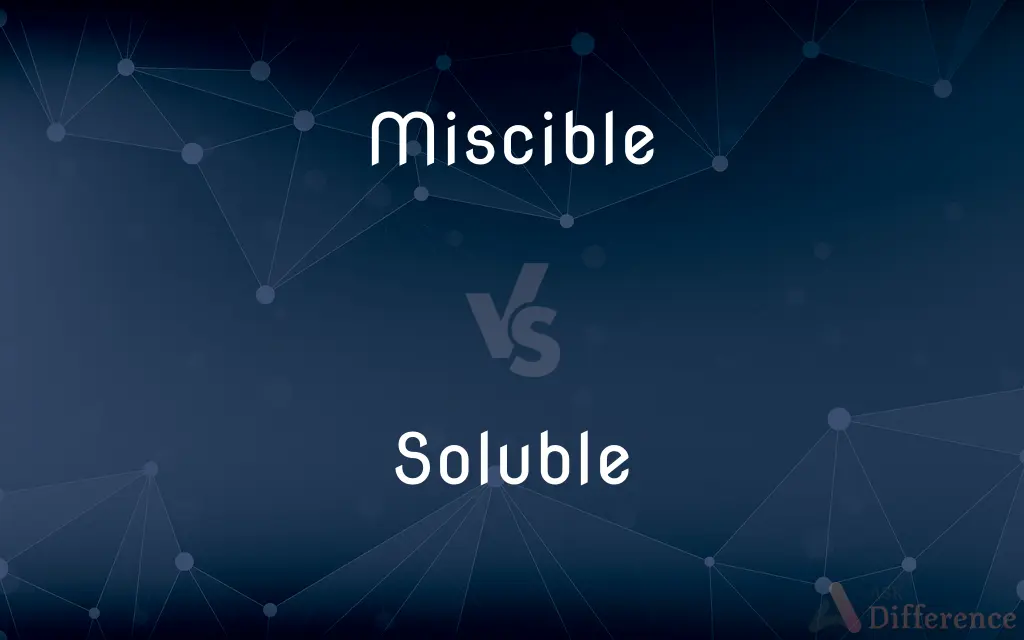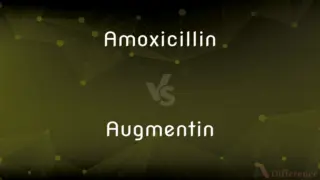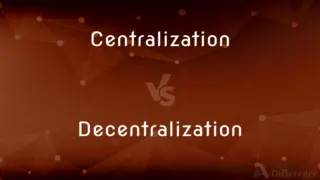Miscible vs. Soluble — What's the Difference?
Edited by Tayyaba Rehman — By Fiza Rafique — Updated on October 10, 2023
"Miscible" denotes the ability of two substances to mix in all proportions, while "Soluble" refers to a substance's capacity to dissolve in a solvent. Both relate to mixing substances but describe different aspects of the process.

Difference Between Miscible and Soluble
Table of Contents
ADVERTISEMENT
Key Differences
"Miscible" and "Soluble" serve to describe different aspects of how substances interact when combined. The term "Miscible" specifies the quality of two or more liquids to mix together in all proportions without separating, emphasizing an aspect where mutual solubility is inherent between the substances. On the other hand, "Soluble" discusses the capability of a particular substance (solute) to dissolve within another (solvent), forming a homogenous solution, pointing to a one-directional dissolving property.
A fundamental distinction emerges between "Miscible" and "Soluble" in the inherent directionality in their traditional use. "Miscible" commonly is employed when referring to the mixing of two liquids, where each liquid can dissolve into the other, reflecting a bidirectional and mutual mixing capacity. In contrast, "Soluble" inherently often reflects an unidirectional property, where one substance (the solute) dissolves into the other (the solvent) without necessitating the reciprocal to be true.
In practical applications, such as in chemistry or cooking, "Miscible" would denote the capacity of two liquids, like ethanol and water, to mix together in any ratio, creating a uniform solution, highlighting a scenario where each substance can integrate fully into the other. "Soluble" would illustrate how sugar (solute) can dissolve into water (solvent), creating a uniform solution, demonstrating a scenario where one substance is integrated into the other, but not vice versa.
Notably, "Miscible" does not typically address the mixing of solids into liquids, rather it is frequently utilized to describe the mixing capabilities of two liquids, indicating a specific context of use that is inherently bound to the state of matter. Alternatively, "Soluble" comfortably extends to describe the dissolving of gases, liquids, or solids into a solvent, indicating a wider context of use that spans various states of matter, thereby being applicable in a broader array of scenarios.
In the realm of scientific terminology and analysis, "Miscible" might be used to describe how two solvents, like acetonitrile and water, can be mixed together in any proportion to create different solvent conditions for techniques like high-performance liquid chromatography (HPLC). Conversely, "Soluble" may describe how a particular analyte, such as a pharmaceutical compound, can dissolve in a solvent, like DMSO, for analysis, revealing the capacity for a substance to be studied in a homogenized form within a solvent.
ADVERTISEMENT
Comparison Chart
Basic Definition
Ability to mix in all proportions
Ability to dissolve in a solvent
Directionality
Bidirectional (mutual mixing)
Unidirectional (solute dissolves in solvent)
Applicable States of Matter
Primarily liquids
Solids, liquids, and gases
Contextual Use
Specific to mutual mixing of liquids
Extensive, applying to various dissolving scenarios
Example
Ethanol and water are miscible
Sugar is soluble in water
Compare with Definitions
Miscible
Miscible implies mutual solubility between two liquids.
Water and ethanol are miscible.
Soluble
Soluble refers to the formation of a homogenous solution.
Oxygen is soluble in water to a degree.
Miscible
Miscible refers to the thorough intermingling of liquids.
Methanol is miscible with water.
Soluble
Soluble points to a physical change upon mixing.
Sugar is soluble in hot tea.
Miscible
Miscible describes the non-separation of combined liquids.
Acetone and water are miscible.
Soluble
Soluble signifies a substance's ability to dissolve in a solvent.
Salt is soluble in water.
Miscible
Miscible indicates uniform mixing in all proportions.
Glycerol and water are miscible.
Soluble
Soluble describes the intermingling at a molecular or ionic level.
Many ionic compounds are soluble in polar solvents.
Miscible
Miscible substances form a single phase when mixed.
Oil and vinegar are not miscible.
Soluble
Soluble indicates the invisibility of solute in a solution.
Dye is soluble in water, creating a colored solution.
Miscible
Capable of being mixed in all proportions. Used of liquids.
Soluble
Capable of being dissolved, especially easily dissolved
Soluble fats.
Miscible
Able to be mixed together in all proportions.
Soluble
Possible to solve or explain
Soluble mysteries.
Miscible
Capable of being mixed; mixable.
Soluble
Able to be dissolved.
Sugar is soluble in water.
Miscible
Mixable in all proportions; forming a single phase when mixed in any proportion; - of liquids; as, water and alcohol are miscible in all proportions; water and gasoline are not miscible; benzene and ethyl alcohol are miscible, and ethyl alcohol is miscible with water, but water is not miscible with benzene..
Soluble
Able to be solved or explained.
That mystery should be easily soluble.
Miscible
(chemistry, physics) capable of mixing
Soluble
Susceptible of being dissolved in a fluid; capable of solution; as, some substances are soluble in alcohol which are not soluble in water.
Sugar is . . . soluble in water and fusible in fire.
Soluble
Susceptible of being solved; as, a soluble algebraic problem; susceptible of being disentangled, unraveled, or explained; as, the mystery is perhaps soluble.
Soluble
Relaxed; open or readily opened.
Soluble
(of a substance) capable of being dissolved in some solvent (usually water)
Soluble
Susceptible of solution or of being solved or explained;
The puzzle is soluble
Common Curiosities
Can Soluble refer to gases dissolving in liquids?
Yes, gases can also be soluble in liquids, like oxygen in water.
Does Soluble always indicate a maximum dissolving capacity?
No, some substances, like table salt in water, have a solubility limit.
Does Miscible always relate to liquids?
Yes, miscible typically pertains to the mixing abilities of liquids.
Does Miscible refer to the dissolving of solids in liquids?
No, miscible generally refers to the mutual mixing of two liquids.
Does Miscible describe a chemical reaction?
No, miscibility involves physical changes, not chemical alterations.
Can Miscibility be partial?
No, miscibility implies full, homogenous mixing in all proportions.
Does Soluble relate to saturation point?
Yes, the saturation point is reached when no more solute can dissolve.
Is there a general rule for solubility?
A common guideline is “like dissolves like,” meaning polar dissolves polar.
Does an increase in pressure affect solubility?
Yes, for gases in liquids, an increase in pressure typically increases solubility.
Are all liquids miscible with each other?
No, some liquids, like oil and water, are immiscible.
Can miscible substances separate over time?
No, miscible substances should not separate and remain a homogenous mixture.
Are all solutes soluble in water?
No, some solutes, like certain oils, are not soluble in water.
Can Miscible be used to describe gases?
Rarely. Miscible is predominantly used to describe liquid-liquid mixing.
Can solubility be affected by temperature?
Yes, solubility can increase or decrease with temperature changes.
Are Miscible substances always compatible chemically?
Not always; some miscible substances may still react chemically when mixed.
Share Your Discovery

Previous Comparison
Amoxicillin vs. Augmentin
Next Comparison
Centralization vs. DecentralizationAuthor Spotlight
Written by
Fiza RafiqueFiza Rafique is a skilled content writer at AskDifference.com, where she meticulously refines and enhances written pieces. Drawing from her vast editorial expertise, Fiza ensures clarity, accuracy, and precision in every article. Passionate about language, she continually seeks to elevate the quality of content for readers worldwide.
Edited by
Tayyaba RehmanTayyaba Rehman is a distinguished writer, currently serving as a primary contributor to askdifference.com. As a researcher in semantics and etymology, Tayyaba's passion for the complexity of languages and their distinctions has found a perfect home on the platform. Tayyaba delves into the intricacies of language, distinguishing between commonly confused words and phrases, thereby providing clarity for readers worldwide.














































